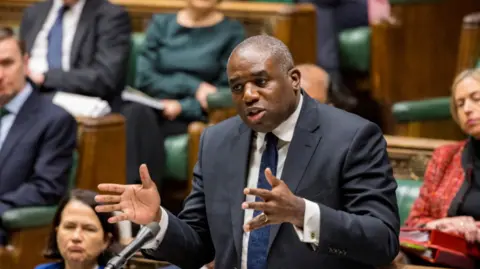The United Kingdom has heightened its measures against Israel in response to the ongoing military operations in Gaza. This escalation includes suspending trade negotiations with Israel, summoning the Israeli ambassador, and imposing a new round of sanctions aimed at West Bank settlers. Foreign Secretary David Lammy has condemned the violence in Gaza, labeling it as “monstrous,” and emphasizing the urgent need for humanitarian assistance amid warnings of an impending famine in the region. The military escalation initiated by Israel over the weekend has drawn significant international concern regarding humanitarian implications.
At the forefront of these discussions, there were intense exchanges between Lammy and the Conservative shadow foreign secretary, Dame Priti Patel. Patel suggested that the UK’s actions might be viewed as favorable by Hamas, while other members of Parliament called for a stronger response from the government. This reflects a growing sentiment among politicians that action must extend beyond verbal condemnations, which have characterized much of the discourse thus far.
In a statement issued by Israel’s foreign spokesman, the country dismissed external criticisms, asserting that such pressures will not deter its efforts to defend itself. The Israeli government has faced mounting accusations of blockading crucial supplies, which include food and medicine, to the already beleaguered population of Gaza for over eleven weeks. As fears of starvation gain traction, international leaders, including those from the UK, Canada, and France, have expressed their outrage, urging Israel to immediately halt its military actions and facilitate humanitarian aid.
Despite Israel’s assertion that it permitted a limited number of aid trucks to enter Gaza, humanitarian officials have labeled this effort as woefully inadequate. Recent approvals have only allowed around 100 aid trucks to enter, which remains significantly below the required levels to address the urgent needs of the population. Lammy has emphasized the importance of accelerating the flow of humanitarian aid into Gaza, expressing that the current situation is “intolerable” and requires an immediate and robust response.
Parliament was filled with shouts of “shame” as Lammy detailed statements made by Israeli officials about their operations in Gaza, which he characterized as “extremism” and condemned sharply. Acknowledging the violence inflicted on the region, Lammy stressed the need for the UK to take a principled stand against actions that might further victimized displaced Palestinians. The sentiments shared in Parliament reflect a broader concern that the Israeli government’s approach jeopardizes not only its own international standing but also the well-being of innocents caught in the conflict.
In light of recent developments, Lammy announced that negotiations for a free trade agreement with Israel have been suspended, articulating that the Netanyahu government’s current posture has distanced Israel from its traditional allies. The UK’s steps include freezing assets and implementing travel bans on specific individuals and companies involved in significant human rights violations in the West Bank.
Simultaneously, some Conservative representatives have expressed skepticism about the effectiveness of the UK’s strategy, suggesting that strong rhetoric alone is insufficient to address the deep-rooted challenges causing human suffering in the region. They raised concerns that the UK government’s actions could inadvertently align with the views of Hamas, prompting deeper reflection on the complexities surrounding international law and humanitarian rights in conflicts.
Global leaders continue their calls for the Israeli government to cease military expansion and allow humanitarian pathways for relief into Gaza. Amidst these discussions, Labour backbench MPs highlighted possible breaches of international law and called for greater scrutiny of Israel’s military strategies in the ongoing conflict. The overall political landscape is laden with tension as the UK navigates its foreign policy stance amid mounting humanitarian crises fueled by military operations.
As the situation evolves, Lammy has committed to taking further action if necessary, reinforcing the government’s position while also receiving defensive comments from Israeli officials. They have described the UK’s recent decisions as “unjustified,” framing them within a broader context of perceived injustices against Israel in the international arena. This reflects the intricate dynamics of international relations entwined with humanitarian considerations and political realities as conflicts in regions like Gaza persist unresolved.



